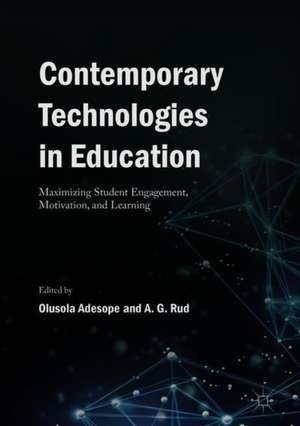Contemporary Technologies in Education: Maximizing Student Engagement, Motivation, and Learning
Editat de Olusola O. Adesope, A.G. Ruden Limba Engleză Hardback – 16 noi 2018
This edited volume provides a critical discussion of theoretical, methodological, and practical developments of contemporary forms of educational technologies. Specifically, the book discusses the use of contemporary technologies such as the Flipped Classroom (FC), Massive Open Online Course (MOOC), Social Media, Serious Educational Games (SEG), Wikis, innovative learning software tools, and learning analytic approach for making sense of big data. While some of these contemporary educational technologies have been touted as panaceas, researchers and developers have been faced with enormous challenges in enhancing the use of these technologies to arouse student attention and improve persistent motivation, engagement, and learning. Hence, the book examines how contemporary technologies can engender student motivation and result in improved engagement and learning. Each chapter also discusses the road ahead and where appropriate, uses the current trend to predict future affordances of technologies.
Preț: 951.18 lei
Preț vechi: 1159.98 lei
-18% Nou
Puncte Express: 1427
Preț estimativ în valută:
182.00€ • 190.54$ • 150.60£
182.00€ • 190.54$ • 150.60£
Carte tipărită la comandă
Livrare economică 07-21 aprilie
Preluare comenzi: 021 569.72.76
Specificații
ISBN-13: 9783319896793
ISBN-10: 3319896792
Pagini: 254
Ilustrații: XXIX, 250 p. 15 illus. in color.
Dimensiuni: 148 x 210 mm
Greutate: 0.61 kg
Ediția:1st ed. 2019
Editura: Springer International Publishing
Colecția Palgrave Macmillan
Locul publicării:Cham, Switzerland
ISBN-10: 3319896792
Pagini: 254
Ilustrații: XXIX, 250 p. 15 illus. in color.
Dimensiuni: 148 x 210 mm
Greutate: 0.61 kg
Ediția:1st ed. 2019
Editura: Springer International Publishing
Colecția Palgrave Macmillan
Locul publicării:Cham, Switzerland
Cuprins
Chapter 1. Maximizing the Affordances of Contemporary Technologies in Education: Promise and Possibilities
Chapter 2. Improving Science Education through Developing Technological Pedagogical Content Knowledge in Teachers
Chapter 3. Toward Understanding the Practice and Potential of Educational Technologies on Our Campuses: Should We Be Skeptics First?
Chapter 4. Promoting engagement through participatory social practices in next generation social media contexts
Chapter 5. Signaling in Disciplinarily-Integrated Games: Challenges in Integrating Proven Cognitive Scaffolds within Game Mechanics to Promote Representational Competence
Chapter 6. Cognitive Tools for Scaffolding Argumentation
Chapter 7. Learning Analytics: Using Data-Informed Decision-Making to Improve Teaching and Learning
Chapter 8. Enhancing Self-Regulated Learning for Information Problem Solving with Ambient Big Data Gathered by nStudy
Chapter 9. Project Based Learning Progressions: Identifying the Nodes of learning in a Project Based Environment
Chapter 10. MOOCS and the Future of Higher EducationChapter 11. Just Posting in the Same Place: Confronting the Paucity of Collaborative Behavior in U.S., K-12 Wikis
Notă biografică
Olusola Adesope is Associate Professor and Coordinator of the Educational Psychology Program in the Department of Educational Leadership, Sport Studies, Educational/Counseling Psychology at Washington State University, USA.
A.G. Rud is Distinguished Professor in the Department of Teaching and Learning at Washington State University, USA.
Textul de pe ultima copertă
This edited volume provides a critical discussion of theoretical, methodological, and practical developments of contemporary forms of educational technologies. Specifically, the book discusses the use of contemporary technologies such as the Flipped Classroom (FC), Massive Open Online Course (MOOC), Social Media, Serious Educational Games (SEG), Wikis, innovative learning software tools, and learning analytic approach for making sense of big data. While some of these contemporary educational technologies have been touted as panaceas, researchers and developers have been faced with enormous challenges in enhancing the use of these technologies to arouse student attention and improve persistent motivation, engagement, and learning. Hence, the book examines how contemporary technologies can engender student motivation and result in improved engagement and learning. Each chapter also discusses the road ahead and where appropriate, uses the current trend to predict future affordances of technologies.
Caracteristici
Identifies common areas of research and build on them to advance the use of technologies for facilitating student engagement, motivation and learning
Explores challenges in moving from discussing pedagogical content knowledge (PCK) to technological pedagogical content knowledge (TPACK) to improve the pedagogy and facilitate learning
Provides an overview of the current state of learning analytics as an emerging technology in education, discussing the central theoretical, methodological and practical issues in the field
Explores challenges in moving from discussing pedagogical content knowledge (PCK) to technological pedagogical content knowledge (TPACK) to improve the pedagogy and facilitate learning
Provides an overview of the current state of learning analytics as an emerging technology in education, discussing the central theoretical, methodological and practical issues in the field
